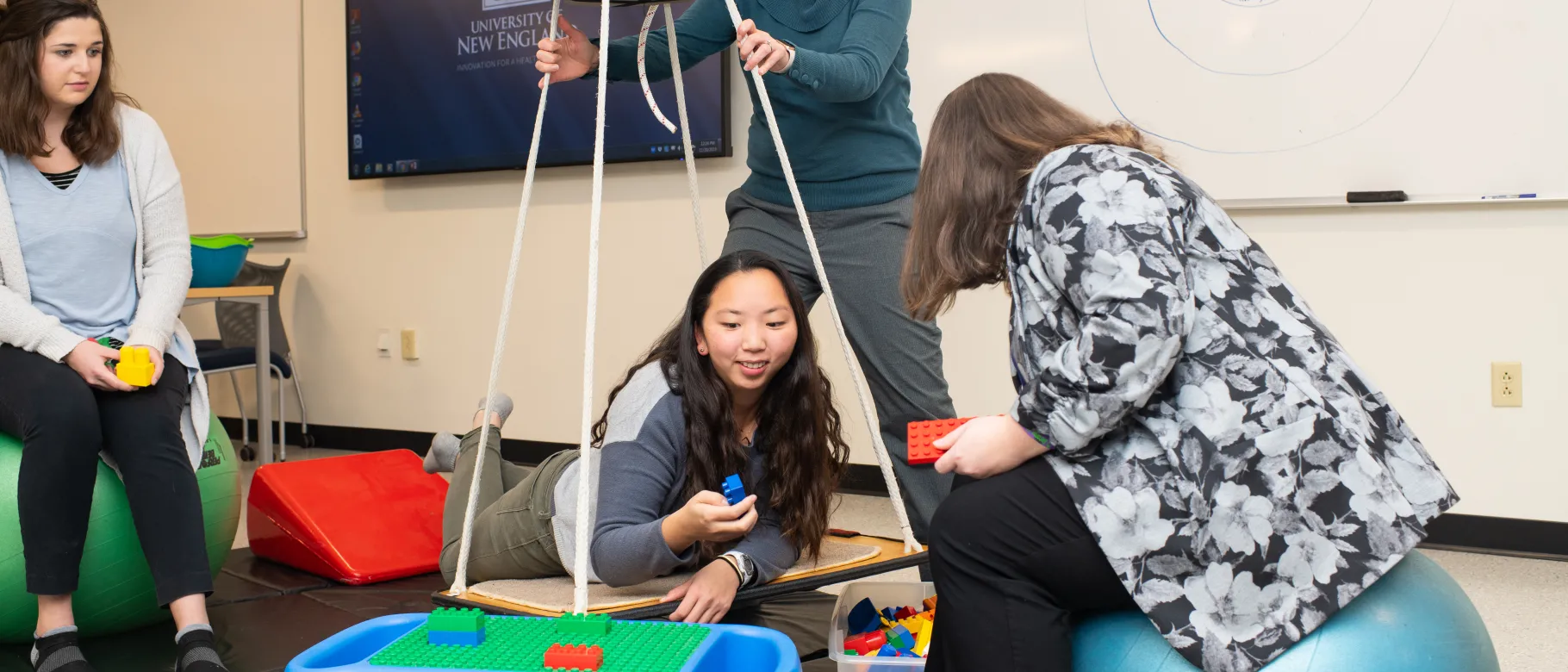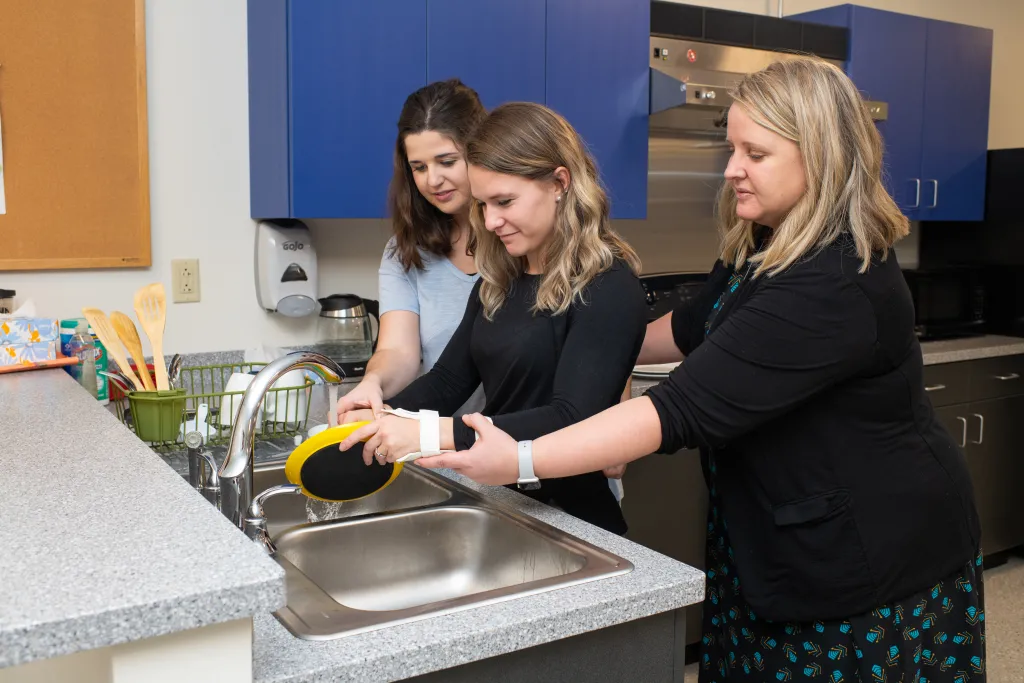At UNE, a dynamic space for occupational therapy education

One corner of the room boasts a bed and adjacent table — another, a tub. Along that same wall, there is a full kitchen, complete with a stove, refrigerator, and microwave. And although it may sound like a studio apartment, this space isn’t for living; it’s for learning.
The University of New England’s Master of Science in Occupational Therapy (M.S.O.T.) Lab, located in Blewett Hall on the University’s Portland Campus, opened in May as an all-in-one space for students to engage with the program’s curriculum.
“We teach a very holistic approach to occupation,” said Kris Winston, Ph.D., OTR/L, FAOTA, program director and associate professor of occupational therapy (OT). “The space is really flexible and allows faculty and students to engage in a variety of learning activities at once so we can act in response to what students need at any given moment.”
Occupational therapy classes at UNE are designed for students and faculty to engage in large group lecture; small-group discussion; experiential, practice-based activities; and reflection, all of which may occur within a single three-hour class.
The lab accommodates these dynamic classes, in which the students themselves often act as both patients and practitioners of occupational therapy.
Students have the capability of participating in a number of occupations, such as meal preparation, sleep and rest, bathing, grooming, and play — all meaningful day-to-day occupations, Winston said.
A dynamic space for learning
In the brightly lit space, students are able to separate and join tables equipped with rolling legs to facilitate group or individual work. A camera can livestream small-group activities onto the large display board, allowing all students (up to 28 at a time) to view the therapeutic practices being conducted by their peers.
Students can even mirror their own computer screens onto a large display to encourage group discussion.
Emily Spencer, B.S., a first-year M.S.O.T. student, was one of the first students to use the new OT Lab when it opened.
A native of East Longmeadow, Massachusetts, Spencer said the lab allows her to engage in hands-on work that she would not be able to perform in a traditional classroom.
“Listening to a lecture is not the same as getting hands on and having that adaptable space to try new things and practice your clinical skills,” she said. “The lab has been a great home for all of my cohort to come together as a welcoming, inclusive spot for us to work together and collaborate.”
The facility also boasts a large storage area that houses all of the department’s equipment, including simulation dolls, exercise balls, and more. That aspect is important for the OT faculty, who say equipment was scattered across several spaces prior to the lab’s opening.
“The ease of that storage space and having access to our equipment at our fingertips is incredible,” said Caroline Beals, M.S., OTR/L, assistant professor of occupational therapy. “It’s made a huge difference.
The storage space has also made a difference for students, Spencer said, as it has allowed them to be creative in finding solutions to occupational problems.
“We can use any of the supplies and get creative with them for our projects,” she said. “It really marries that creative aspect with the typical clinical equipment that you use in practice.”
The adaptive nature of the space has also been beneficial for faculty.
“As a faculty member, I think it’s great to have a space that I know and know what I can do with,” said Beals. “It’s definitely made me feel more comfortable and confident in my teaching.”
A competitive edge
An important part of UNE’s M.S.O.T. program is the opportunity to engage in interprofessional education (IPE). Not only does the OT Lab allow for collaborative learning within occupational therapy, but also allows students to reach across disciplines.
That, Winston said, helps UNE maintain a competitive edge.
“Interprofessional education introduces students to other health professions and allows students to develop really strong advocacy skills for themselves as OTs and the profession as a whole,” Winston said.
A distinguishing component of the OT program is a course specifically on Leadership and Advocacy, which teaches students how to be everyday leaders in their field. Not all OT programs offer courses solely on leadership, Winston said, and the course helps students shape the discipline.
“You’re a leader when you’re working with a client,” she said. “With how you think about advocating for your clients and how you choose to conduct yourself, you can lead from the back.”
Beals, who teaches the Leadership and Advocacy course, said the new lab allows both her and her students to better engage with the course material.
“Health care and the health care arena is changing constantly. I think what sets our program apart is that we recognize we want our students to embrace leadership and advocacy in their daily practice,” she said. “Creating a space where students can have those conversations that are hard, challenging, and sometimes divisive is really important.”
Spencer said the interprofessional nature of the OT program has helped her to identify her leadership style and where her strengths lie but has enabled her to recognize areas in which she could improve. She also said IPE is what drew her to UNE in the first place.
“I liked having all the health professions on one campus to not only learn about my specific practice area, but to understand how I can interact with other professionals in the future to provide the best care for my clients,” Spencer said.
Winston added that an OT program based in Maine also helps foster a greater understanding of the occupational therapy profession. From fishing to logging to working in mills Maine is rife with occupational opportunities and hazards.
“We have such a unique context here in Maine,” she said. “From an occupational perspective, having our students examine the aspects of diversity that Maine has — in the work that people do and the things that are happening in our communities — they are being exposed to OT by virtue.”

